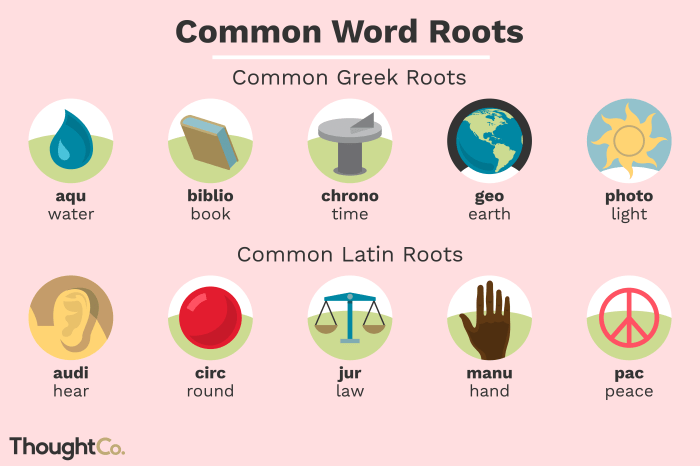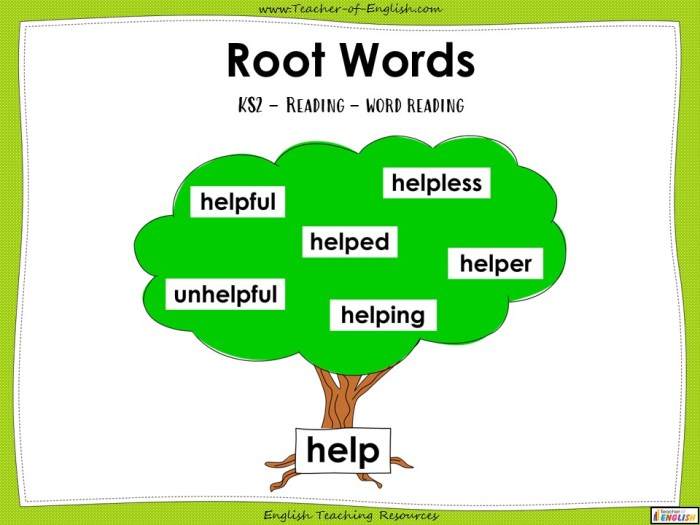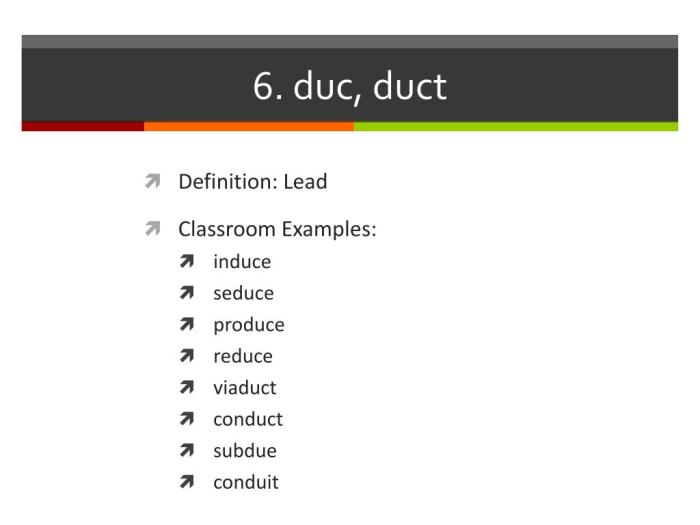Words with the root word duc embark on a captivating journey, tracing their origins from the depths of Latin to their widespread use in various languages. These words, sharing a common thread of meaning, weave a rich tapestry of expression that has shaped countless aspects of human communication.
From the grandeur of literature to the precision of science, words with the root duc have left an indelible mark on our understanding of the world. Their etymology, semantic relationships, and usage across different contexts reveal a fascinating story that unfolds in the pages that follow.
Etymology of Duc: Words With The Root Word Duc
The root word “duc” originates from the Latin word “ducere,” meaning “to lead” or “to guide.” This Latin root has significantly influenced the development of words in various languages, including English, French, and Spanish.
Evolution of “Duc” in Different Languages
Over time, “duc” evolved differently in various languages:
- English:“Duc” evolved into words like “duke,” “duct,” and “duce,” all retaining the sense of “leading” or “guiding.”
- French:“Duc” became “duc,” meaning “duke” or “leader.”
- Spanish:“Duc” transformed into “duque,” also meaning “duke.”
Words Derived from Duc

The root word “duc” gives rise to a diverse range of words, each carrying a unique meaning and function in the English language. These words can be categorized into various parts of speech, including nouns, verbs, adjectives, and adverbs.
Nouns
- Duchess: A woman who holds the rank of a duke or is married to a duke.
- Dukedom: The territory or domain ruled by a duke.
- Duchy: A territory ruled by a duke or duchess.
Verbs
- Conduct: To lead, guide, or direct.
- Deduct: To subtract or take away.
- Induct: To bring in or introduce formally.
- Produce: To create, make, or bring forth.
- Reduce: To make smaller, less, or fewer.
Adjectives
- Ducal: Relating to a duke or duchy.
- Productive: Capable of producing or creating.
- Reductive: Tending to reduce or make smaller.
Adverbs
- Conductively: In a manner that allows for the passage of electricity or heat.
- Productively: In a manner that results in the creation or production of something.
Semantic Relationships

Words with the root “duc” share a common core meaning related to leading, guiding, or directing. They encompass a range of semantic nuances, including:
Guidance and Direction:These words convey the idea of providing guidance or direction, such as educate(to lead out of ignorance), induce(to lead into a particular state), and deduce(to lead from one premise to another).
Hierarchy and Authority
- Leadership and Authority:Words like duke(a military or political leader) and duce(a leader in ancient Rome) highlight the notion of leadership and authority.
- Hierarchy and Subordination:Terms such as duct(a passage or channel) and aqueduct(a structure for conveying water) suggest a hierarchical relationship, with one component leading or guiding the flow of another.
Usage in Different Contexts

Words with the root “duc” are employed in a variety of contexts, ranging from literature to science and technology.
Literature, Words with the root word duc
In literature, “duc” derivatives are often used to describe the leadership and guidance of characters. For instance, in Shakespeare’s Henry V, the titular king is referred to as a “duc” in recognition of his ability to lead his troops to victory.
Science
In the realm of science, “duc” derivatives are commonly used to describe the flow or movement of substances. For example, the term “duct” is used to refer to a tube or channel through which fluids or gases pass. In anatomy, the “ductus deferens” is a tube that carries sperm from the epididymis to the urethra.
Technology
Within the technological domain, “duc” derivatives are frequently employed to describe the transfer of data or signals. For instance, the term “ducting” is used to refer to the process of guiding electromagnetic waves through a specific path. In computer science, a “ductus” is a type of data structure that allows for the efficient organization and retrieval of information.
Cultural and Historical Significance

Words with the root “duc” have played a significant role in shaping societies and cultures throughout history. The concept of “leading” and “guiding” has been central to various civilizations, influencing political systems, military strategies, and religious beliefs.
Leadership and Governance
In ancient Rome, the term “dux” referred to a military commander or governor. This concept of leadership extended to other parts of Europe, where “duke” became a title for high-ranking nobles and military leaders. The idea of a “duke” as a powerful and influential figure has persisted in modern society, with many countries still using the title for their leaders.
Religion and Spirituality
In Christianity, the term “duke” is used to refer to archangels, celestial beings who lead and protect. This usage reflects the belief in a hierarchy of spiritual beings, with dukes occupying a prominent position. The concept of divine guidance and leadership has influenced religious practices and beliefs in many cultures.
Education and Scholarship
The word “doctor” derives from the Latin “docere,” meaning “to teach.” In medieval universities, doctors were individuals who had mastered a particular field of knowledge and were authorized to teach and guide students. The title of “doctor” has since become a prestigious academic distinction, signifying expertise and authority in a specific discipline.
The Latin root word “duc” means “to lead.” It’s found in many English words, like “duke” and “education.” Speaking of education, if you’re studying for the abeka world history test 10 , you’ll need to know about the Roman Empire.
The Romans were known for their great leaders, like Julius Caesar and Augustus. They also had a strong educational system that helped to spread their culture throughout the world. Back to our root word, “duc” also appears in the word “duct,” which is a tube that carries something.
So, whether you’re studying history or just trying to understand how your plumbing works, the root word “duc” can help you out.
Arts and Culture
Words with the root “duc” have also found their way into the arts and culture. In music, the term “duet” refers to a composition for two performers, highlighting the idea of collaboration and shared leadership. Similarly, in literature, the concept of a “protagonist” or “leading character” is essential to storytelling, shaping the narrative and guiding the reader’s experience.
Visual Representation (Optional)

Visual representations can enhance understanding of the words with the root “duc” by organizing them based on their part of speech and illustrating their semantic relationships.
Table of Words by Part of Speech
The following table categorizes the words derived from “duc” according to their grammatical function:
| Part of Speech | Words |
|---|---|
| Noun | duct, ducat, duchy, duke |
| Verb | deduce, induce, reduce |
| Adjective | ductile |
Flowchart of Semantic Relationships
The flowchart below depicts the semantic relationships among the words with the root “duc”:

The flowchart shows how the different words are connected through shared meanings and concepts.
General Inquiries
What is the origin of the root word duc?
The root word duc originates from the Latin word ducere, meaning “to lead” or “to guide.”
How has the root word duc evolved over time?
The root word duc has evolved into a variety of words in different languages, including “duke,” “duct,” “educate,” and “introduce.”
What are some common semantic relationships between words with the root word duc?
Words with the root word duc often share meanings related to leadership, guidance, and movement.